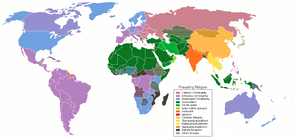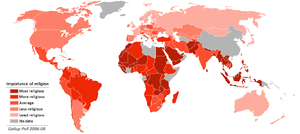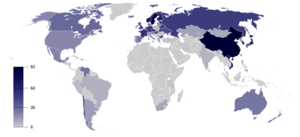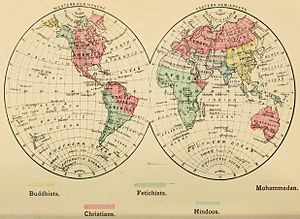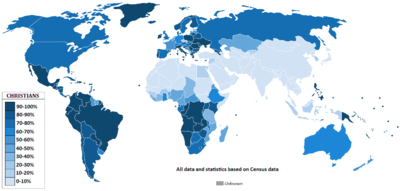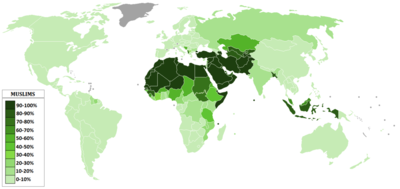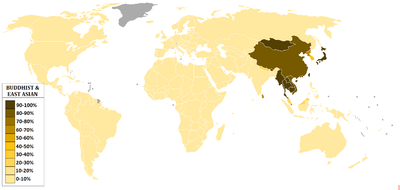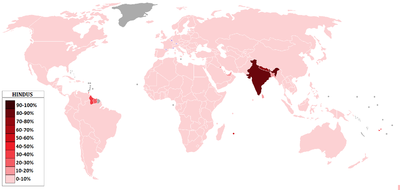- List of religious populations
-
These are lists of religious demographics and religions by country.
World Religions Four largest religions Adherents Percentage of world population Further information World population 6.8 billion [1][2] Figure used by individual articles Christianity 1.9 billion - 2.1 billion [3] 29% - 32% Christianity by country Islam 1.5 billion [4] 19% - 23% Islam by country Buddhism 500 million - 1.5 billion [5][6][7][8] 7% - 23% Buddhism by country Hinduism 900 million - 1 billion [9][10] 14% Hinduism by country Total 4.65 billion - 6 billion 68% - 90% The table above is compiled from the relevant Wikipedia pages listing Religions by Country. Please note that although figures are an approximation there are many sources. Please see individual pages (Linked in Table) for details.
The numbers of adherents to organised religions in the world is difficult to accurately ascertain. Therefore figures and estimates are included from multiple sources to show the reader the problem in compiling such statistics.
Contents
Adherents.com estimates
Adherents.com says "Sizes shown are approximate estimates, and are here mainly for the purpose of ordering the groups, not providing a definitive number."[1]
Religion Adherents Christianity 2.1 billion Islam 1.5 billion Nonreligious/agnostic/atheism 1.1 billion Hinduism 900 million Chinese traditional religion 394 million Buddhism 376 million Animist religions 300 million African traditional/diasporic religions 100 million Sikhism 23 million Juche 19 million Spiritism 15 million Judaism 14 million Baha'i 7 million Jainism 4.2 million Shinto 4 million Cao Dai 4 million Zoroastrianism 2.6 million Tenrikyo 2 million Neo-Paganism 1 million Unitarian Universalism 800,000 Rastafari Movement 600,000 - Notes
- These figures may incorporate populations of secular/nominal adherents as well as syncretist worshipers, although the concept of syncretism is disputed by some.
- Nonreligious includes agnostic, atheist, secular humanist, and people answering 'none' or no religious preference. Half of this group is theistic but nonreligious. [2]
- For Eastern religions such as Buddhism, Taoism, Confucianism, Shinto or animism etc., people often have religions which are a mix of belief systems. This leads to the unusually large uncertainty in the calculations for Buddhism. The lower number of approximately 400 million represents traditional Buddhists (have taken refuge in the Three Jewels, those following all of the precepts of Buddhisim laid down by the Buddha,) whereas the larger number of 1.5 billion includes "natural Buddhists" (as well as secular/nominal Buddhists), lacking specific ceremony, as long as they do not profess belief in another religion. Main article: Buddhism by country.[3][4]
- It is hard to accurately report the actual number of adherents of Judaism as there are Jews that do not practice the religion that may be under the secular/irreligious category even though they are fully Jewish.
- Chinese traditional religion is described as "the common religion of the majority Chinese culture: a combination of Confucianism, Buddhism, and Taoism, as well as the traditional non-scriptural/local practices and beliefs."
ReligionFacts estimates
Religions or worldviews with a million or more adherents.[5]
To verify data within this chart, please check the above reference
Religion Population Religious text Type Holiest place Founded Afterlife Christianity 2 billion Bible Abrahamic Jerusalem/Rome (Catholicism only) Levant, 1st century AD Eternal hell, heaven and temporal purgatory (Catholicism only) Islam 1.5 billion Quran Abrahamic Mecca Mecca around 610 Eternal heaven, hell Atheism 1.1 billion none N/A none N/A N/A Hinduism 900 million Vedas Indian religions Varanasi Around 1700–1100 BCE, North India Reincarnation until moksha Chinese folk religion 394 million Taoic Buddhism 360 million Tripiṭaka Indian religions Bodh Gaya, 5th century BCE, India Reincarnation until nirvana Sikhism 23 million Guru Granth Sahib Indian religions Amritsar, Around 1490, Punjab, North India Reincarnation until union with Waheguru or God. Taoism 20 million Tao Te Ching Taoic Around 500 BCE, China Judaism 14 million Tanakh Abrahamic Jerusalem Around 1500 BCE Symbolic Heaven and Gehenna Spiritism 11 million none New religious movement 1850s Falun Gong 10 million Zhuan Falun, writings by Master Li Taoic 1992, China Not addressed Bahá'í 5-7 million Aqdas Abrahamic Acre Iran , in 1844 Symbolic heaven and hell Cao Dai 4-6 million Caodai canon Taoic Tay Ninh Vietnam Confucianism 4-6 million Analects Taoic Qufu China 551–478 BC Not addressed New Age 5 million N/A New religious movement none 19th century karma Jainism 4.2 million Mahavira Indian religions Palitana Pre-historic to 5th century BCE, India Reincarnation until liberation Shinto 3-4 million Kojiki etc. Taoic Ise, Mie N/A varies Wicca 1-3 million none New religious movement none 1920s varies Aladura 1 million none New religious movement Lagos Nigeria in 1918 varies Rastafari 1 million Kebra Nagast New religious movement Ethiopia Jamaica in 1920s immortality Unitarian Universalism 800,000 varies New religious movement none United States in 1961 varies Deism Unknown none N/A none Ancient history not addressed - Chinese Folk Religion consists of Taoism and Confucianism.
- The atheist section includes the irreligious, humanists, agnosticism, freethinkers, brights, skepticism (non-believer) and others who hold a naturalistic worldview.
- Christianity includes Orthodox Christianity, Catholic Church and Protestantism
- Islam includes Shia Islam, Sufism and Sunni Islam
- Buddhism includes Theravada, Mahayana
- Hinduism includes Vaishnavites and Shaivites
- Traditional religion includes polytheism, shamanism, pantheism, and animism
By proportion
Christians
Countries with the greatest proportion of Christians from Christianity by country (as of 2008[update]):
 Vatican City 100% (100% Roman Catholic)
Vatican City 100% (100% Roman Catholic) Federated States of Micronesia ~100%[6]
Federated States of Micronesia ~100%[6] Samoa ~100%[7]
Samoa ~100%[7] Panama ~ 100%[8]
Panama ~ 100%[8] Romania 99%[9]
Romania 99%[9] East Timor 99%[10][11] (90% Roman Catholic)
East Timor 99%[10][11] (90% Roman Catholic) Bolivia 98.1%[12][13] (95% Roman Catholic)
Bolivia 98.1%[12][13] (95% Roman Catholic) Venezuela 98%[14] (mostly Roman Catholic)
Venezuela 98%[14] (mostly Roman Catholic) Marshall Islands 97.2%[15]
Marshall Islands 97.2%[15] Peru 97.1%[16]
Peru 97.1%[16] Paraguay 96.9%[17] (mostly Roman Catholic)
Paraguay 96.9%[17] (mostly Roman Catholic) Papua New Guinea 96.4%[18]
Papua New Guinea 96.4%[18] Kiribati 96%[19]
Kiribati 96%[19] Angola +95%[20]
Angola +95%[20] Barbados +95%[21]
Barbados +95%[21] Cyprus 95%[22](mostly Greek Orthodox)
Cyprus 95%[22](mostly Greek Orthodox) Mexico 95%[23] (mostly Roman Catholic)
Mexico 95%[23] (mostly Roman Catholic) Malta 95%[24]
Malta 95%[24] Colombia 93.5%[25] (mostly Roman Catholic)
Colombia 93.5%[25] (mostly Roman Catholic) Guatemala +90%[26][27] (50-60% Roman Catholic and ~30% Protestant, 0-10% non-Christian)
Guatemala +90%[26][27] (50-60% Roman Catholic and ~30% Protestant, 0-10% non-Christian) Philippines +90% (Roman Catholic)
Philippines +90% (Roman Catholic)
Muslims
Countries with the greatest proportion of Muslims from Islam by country (as of 2008[update]):
 Saudi Arabia 100% (90% Sunni, 10% Shi'a)
Saudi Arabia 100% (90% Sunni, 10% Shi'a) Afghanistan 99.9% (85% Sunni, 14% Shi'a)
Afghanistan 99.9% (85% Sunni, 14% Shi'a) Yemen 99.9% (65-70% Sunni, 30-35% Shi'a)
Yemen 99.9% (65-70% Sunni, 30-35% Shi'a) Mauritania 99.9% (mostly Sunni)
Mauritania 99.9% (mostly Sunni) Somalia 99.9% (mostly Sunni)
Somalia 99.9% (mostly Sunni) Maldives 99.33% (mostly Sunni)
Maldives 99.33% (mostly Sunni) Oman 99% (mostly Ibadhi)[28]
Oman 99% (mostly Ibadhi)[28] Djibouti +99% (mostly Sunni)[29]
Djibouti +99% (mostly Sunni)[29] Tunisia 99% (mostly Sunni)
Tunisia 99% (mostly Sunni) Algeria 99% (mostly Sunni)
Algeria 99% (mostly Sunni) Turkey 99% (85% Sunni, 15% Shia)
Turkey 99% (85% Sunni, 15% Shia) Bahrain 98% (mostly Shia) [30]
Bahrain 98% (mostly Shia) [30] Comoros 98% (mostly Sunni)[31]
Comoros 98% (mostly Sunni)[31] Morocco 98.7% (mostly Sunni)
Morocco 98.7% (mostly Sunni) Niger +98% (95% Sunni and Sufi)[32]
Niger +98% (95% Sunni and Sufi)[32] Iran 98% (mostly Shi'a)
Iran 98% (mostly Shi'a) Pakistan 97%[33] (75-80% Sunni, 20-25% Shi'a)[34]
Pakistan 97%[33] (75-80% Sunni, 20-25% Shi'a)[34] Iraq 97% (55% Shi'a, 45% Sunni)
Iraq 97% (55% Shi'a, 45% Sunni) Libya 99% (Sunni)
Libya 99% (Sunni) Azerbaijan 96%[35] (mostly Shia)
Azerbaijan 96%[35] (mostly Shia) Lebanon 59.7%[36] (Shia'a 35%, Sunni 25%, Druze 5%)
Lebanon 59.7%[36] (Shia'a 35%, Sunni 25%, Druze 5%)
Remarks: Although Islam is the state religion of most Middle Eastern countries,this list excludes Saudi Arabia where 100% of national citizens are Muslims,[37] because there is a substantial number of non-Muslim residents there (mostly Hindu and Christian; as well as Buddhist, Sikh and Jewish minorities). So the total Muslim population in Saudi Arabia is around 25 million (20 million native Saudi citizens with 1.5 million Bangladeshis, 1 million Pakistanis, 1 million Egyptians, 600,000 Indonesians, 250,000 Palestinians, and significant Muslim numbers among 1.6 million Indians, 150,000 Lebanese, as well as 100,000 Eritreans) or only about 90% of the total population.[38] Some other Persian Gulf countries such as Kuwait, Qatar and United Arab Emirates are also excluded due to their large number of non-Muslim foreign immigrants.
Buddhists
Countries with the greatest proportion of Buddhists (included other folk religions) from Buddhism by country (as of 2008[update]):
 Cambodia 96%[39] (Theravada, Muslim 3%, Christian and other 2%)
Cambodia 96%[39] (Theravada, Muslim 3%, Christian and other 2%) Thailand 94.6%[40] (Theravada, Muslim 4%, Christian 0.7%, other 0.3%)
Thailand 94.6%[40] (Theravada, Muslim 4%, Christian 0.7%, other 0.3%) Mongolia 90%[41] (Tibetan Buddhism, Muslim 5%, Christian and other 5%)
Mongolia 90%[41] (Tibetan Buddhism, Muslim 5%, Christian and other 5%) Hong Kong Triple religion 90% (10% practising[42])[43] ("Triple religion", Christian and others 7%)
Hong Kong Triple religion 90% (10% practising[42])[43] ("Triple religion", Christian and others 7%) Myanmar 89% (Theravada, Christian 4%, Muslim 4%, Animism or other 2%) [44]
Myanmar 89% (Theravada, Christian 4%, Muslim 4%, Animism or other 2%) [44] Vietnam 85% (15% practicing)("Triple religion", Christian 7%, Cao Dai 3%, other 3%)
Vietnam 85% (15% practicing)("Triple religion", Christian 7%, Cao Dai 3%, other 3%) Macau 85%[45] ("Triple religion", Christian 6%, Atheist or other 3%)
Macau 85%[45] ("Triple religion", Christian 6%, Atheist or other 3%) Laos 67%-98% [46][47][verification needed] (67% Theravada with 31% traditional animist.)
Laos 67%-98% [46][47][verification needed] (67% Theravada with 31% traditional animist.) People's Republic of China 50-+80%[48][49][50] (8% practicing[51]) (Triple religion, Atheist 10.5%, Christian 4%, Muslim 1.5%)
People's Republic of China 50-+80%[48][49][50] (8% practicing[51]) (Triple religion, Atheist 10.5%, Christian 4%, Muslim 1.5%) Bhutan +66-75%[52] (Lamaistic, Hindu 25%)
Bhutan +66-75%[52] (Lamaistic, Hindu 25%) Christmas Island 75% (Triple religion, Christian 12%, Muslim 10%, other 3%)
Christmas Island 75% (Triple religion, Christian 12%, Muslim 10%, other 3%) Sri Lanka 70% (Theraveda, Hindu 15%, Christian 7.5%, Muslim 7.5%)
Sri Lanka 70% (Theraveda, Hindu 15%, Christian 7.5%, Muslim 7.5%) Republic of China (Taiwan) 35.1-75%[53][54] ("Triple religion", Christian 4%, other 2%)
Republic of China (Taiwan) 35.1-75%[53][54] ("Triple religion", Christian 4%, other 2%) Singapore 33-44%[55] ("Triple religion" 33% Buddhist, 11% Taoist)
Singapore 33-44%[55] ("Triple religion" 33% Buddhist, 11% Taoist) Japan 20-45%(Shinto with Mahayana) (20% to 45% believe in Buddha)
Japan 20-45%(Shinto with Mahayana) (20% to 45% believe in Buddha) Malaysia 23% (Muslim 60.3%, "Triple religion", Christian 9%, Hindu 6%, other 1.7%)
Malaysia 23% (Muslim 60.3%, "Triple religion", Christian 9%, Hindu 6%, other 1.7%) South Korea 22.8%[56][57](Mahayana with Confucianist, Christian 29%, other)
South Korea 22.8%[56][57](Mahayana with Confucianist, Christian 29%, other) Brunei 15% (Muslim 67%, "Triple religion", Christian 10%, other 8%)
Brunei 15% (Muslim 67%, "Triple religion", Christian 10%, other 8%) Nepal 11.4% (Hindu 80.6%, Tibetian Buddhist, Muslim 4%, other 4%)
Nepal 11.4% (Hindu 80.6%, Tibetian Buddhist, Muslim 4%, other 4%)
Remarks: "Triple religion" (or "Chinese-Mahayana Buddhism" or "Far East Asian Buddhism") is the mixture of Mahayana Buddhism, with Taoism and Confucianism. Because officially Communist governments that often forcibly suppressed religious expressions still rule a number of traditionally Buddhist countries, and because Buddhists often practice other traditional East Asian religions, the figures could be much higher in these regions. Mahayana Buddhism in Far East Asian countries has a very wide meaning. That is why in such countries as China, Japan, Vietnam, North and South Korea, Taiwan, Hong Kong, and Singapore, the three religions of Buddhism, Taoism and Confucianism are often all considered at once. This is referred to as a "Triple religion", with Gautama Buddha in the center, Laozi in the left, and Confucius in the right. In some regions, such as Japan, belief systems vary with differing emphasis on Shintoism, as well as Ancestor Worship. As such, the Buddhist population is difficult to gauge exactly, but is often nominal. The lesser percentage given is a number of Buddhists who have taken the formal step of going for refuge. And the wider percentage given are informal/nominal adherents of combined Buddhism with its related religions.[58][59][60][61][62][63][64][65] See Buddhism by country and Irreligion.
Hindus
Countries with the greatest proportion of Hindus from Hinduism by country (as of 2008[update]):
 Nepal 86.5%[66]
Nepal 86.5%[66] India 80.5%[67]
India 80.5%[67] Mauritius 54%[68]
Mauritius 54%[68] Guyana 28%[69]
Guyana 28%[69] Fiji 27.9%[70]
Fiji 27.9%[70] Bhutan 25%[52]
Bhutan 25%[52] Trinidad and Tobago 22.5%
Trinidad and Tobago 22.5% Suriname 20%[71]
Suriname 20%[71] Sri Lanka 15%[72]
Sri Lanka 15%[72] Bangladesh 9.2%[73]
Bangladesh 9.2%[73] Qatar 7.2%
Qatar 7.2% Réunion 6.7%
Réunion 6.7% Malaysia 6.3%[74]
Malaysia 6.3%[74] Bahrain 6.25%
Bahrain 6.25% Kuwait 6%
Kuwait 6% United Arab Emirates 5%
United Arab Emirates 5% Singapore 4%
Singapore 4% Oman 3%
Oman 3% Belize 2.3%
Belize 2.3% Seychelles 2.1%[75]
Seychelles 2.1%[75]
Ethnic / Indigenous
All of the below come from the U.S Department of State 2009 International Religious Freedom Report, [11] based on the highest estimate of people identified as indigenous or followers of indigenous religions that have been well-defined. Due to the syncretic nature of these religions, the following numbers may not reflect the actual number of practitioners.
 Cuba 100%[76]
Cuba 100%[76] Bolivia 55%[77]
Bolivia 55%[77] Laos 55%[78]
Laos 55%[78] Haiti 50%[79]
Haiti 50%[79] Guinea-Bissau 50%
Guinea-Bissau 50% Cameroon 40%
Cameroon 40% Togo 33%[80]
Togo 33%[80] Côte d'Ivoire 25%
Côte d'Ivoire 25% Sudan 25%[81]
Sudan 25%[81] Benin 23%
Benin 23% Burundi 20%
Burundi 20% India 100%[82]
India 100%[82] Philippines 16%[83]
Philippines 16%[83] Burkina Faso 15%
Burkina Faso 15% New Zealand 15%[84]
New Zealand 15%[84] South Africa 15%[85]
South Africa 15%[85] Democratic Republic of the Congo 12%
Democratic Republic of the Congo 12% Central African Republic 10%
Central African Republic 10% Gabon 10%
Gabon 10% Lesotho 10%
Lesotho 10% Nigeria 10%
Nigeria 10% Sierra Leone 10%[86]
Sierra Leone 10%[86] Indonesia 9%[87]
Indonesia 9%[87] Kenya 9%
Kenya 9% Palau 9%[88]
Palau 9%[88] Ghana 8.5%
Ghana 8.5% Guinea 5%
Guinea 5%
Jews
Countries with the greatest proportion of Jews (as of 2007[update]):
 Israel 76.2%
Israel 76.2% Palestinian territories 11.09%
Palestinian territories 11.09% Monaco 3%
Monaco 3% United States 2.5%
United States 2.5% Gibraltar 2.1%
Gibraltar 2.1% Cayman Islands 1.71%[citation needed]
Cayman Islands 1.71%[citation needed] Netherlands Antilles^ 1.3%
Netherlands Antilles^ 1.3% Canada 1.1%
Canada 1.1% France 1%
France 1% Belarus 1%
Belarus 1% Argentina 0.8%
Argentina 0.8% Hungary 0.8%
Hungary 0.8% Uruguay 0.75%
Uruguay 0.75% Russia 0.5%
Russia 0.5% United Kingdom 0.5%
United Kingdom 0.5% Australia 0.45%
Australia 0.45% Netherlands 0.3%
Netherlands 0.3% Germany 0.25%
Germany 0.25% Georgia 0.22%
Georgia 0.22%
^: As of 2010, no longer exists as a country.
Bahá'ís
Countries with the greatest proportion of Bahá'ís (as of 2000[update]):
 Nauru 9.22%
Nauru 9.22% Tonga 6.09%
Tonga 6.09% Tuvalu 5.86%
Tuvalu 5.86% Kiribati 4.70%
Kiribati 4.70% Tokelau 4.33%
Tokelau 4.33% Cocos (Keeling) Islands 3.72%
Cocos (Keeling) Islands 3.72% Bolivia 3.25%
Bolivia 3.25% Falkland Islands 2.98%
Falkland Islands 2.98% Vanuatu 2.78%
Vanuatu 2.78% Belize 2.73%
Belize 2.73% Samoa 2.37%
Samoa 2.37% Guyana 2.09%
Guyana 2.09% United Arab Emirates 1.95%
United Arab Emirates 1.95% São Tomé and Príncipe 1.88%
São Tomé and Príncipe 1.88% Mauritius 1.84%
Mauritius 1.84% Zambia 1.70%
Zambia 1.70% Dominica 1.61%
Dominica 1.61% Federated States of Micronesia 1.61%
Federated States of Micronesia 1.61% Niue 1.53%
Niue 1.53% Marshall Islands 1.50%
Marshall Islands 1.50%
Sources: Year 2000 Estimated Baha'i statistics from: David Barrett, World Christian Encyclopedia, 2000; Total population statistics, mid-2000 from Population Reference Bureau [12] and The World Almanac and Book of Facts 2004.
Irreligious & Atheist
See also: Irreligion by countryCountries with the greatest proportion of people without religion (including Agnostics and Atheists) from Irreligion by country (as of 2007[update]):
 Japan 64–88% (76%)[89]
Japan 64–88% (76%)[89] Sweden 46-85% (65.5%)
Sweden 46-85% (65.5%) Denmark 43-80% (61.5%)
Denmark 43-80% (61.5%) Macau 60.9%[51]
Macau 60.9%[51] Czech Republic 54–61% (57.5%)
Czech Republic 54–61% (57.5%) Hong Kong 57%[42]
Hong Kong 57%[42] France 43-64%[90] (53.5%)
France 43-64%[90] (53.5%) Norway 31–72% (51.5%)
Norway 31–72% (51.5%) Estonia 49%
Estonia 49% Netherlands 39-55% (47%)
Netherlands 39-55% (47%) Finland 28–60% (44%)
Finland 28–60% (44%) United Kingdom 31–52% (41.5%)[90]
United Kingdom 31–52% (41.5%)[90] South Korea 30-52% (41%)
South Korea 30-52% (41%) Germany 25[91]-55%[92] (40%)
Germany 25[91]-55%[92] (40%) Hungary 32-46% (39%)
Hungary 32-46% (39%) Belgium 42-43% (38.75%)
Belgium 42-43% (38.75%) New Zealand 34.7%[93]
New Zealand 34.7%[93] Bulgaria 34-40% (37%)
Bulgaria 34-40% (37%) Slovenia 35-38% (36.5%)
Slovenia 35-38% (36.5%) Russia [94] 13–48% (30.5%)
Russia [94] 13–48% (30.5%)
Remarks: Ranked by mean estimate which is in brackets. High irreligious estimates for China and North Korea are very likely highly exaggerated.[89]
Sikhism
Countries with the greatest proportion of Sikhs:
 India 2.3%
India 2.3% United Kingdom 1.2%[95][96]
United Kingdom 1.2%[95][96] Canada 0.9%[97]
Canada 0.9%[97] Malaysia 0.5%[98]
Malaysia 0.5%[98] Fiji 0.3%[99]
Fiji 0.3%[99] Singapore 0.3%[100][101]
Singapore 0.3%[100][101] United States 0.2%[102][103]
United States 0.2%[102][103] New Zealand 0.2%[104]
New Zealand 0.2%[104] Australia 0.1%[105][106]
Australia 0.1%[105][106] Italy 0.1%[107]
Italy 0.1%[107]
The Sikh homeland is the Punjab state, in India, where today Sikhs make up approximately 59% of the population. This is the only place where Sikhs are in the majority. Sikhs have emigrated to countries all over the world - especially to English-speaking and East Asian nations. In doing so they have retained, to an unusually high degree, their distinctive cultural and religious identity. Sikhs are not ubiquitous worldwide in the way that adherents of larger world religions are, and they remain primarily an ethnic religion. But they can be found in many international cities and have become an especially strong religious presence in the United Kingdom and Canada.[108]
Taoists/Confucianists/Chinese traditional religionists
As a spiritual practice, Taoism has made fewer inroads in the West than Buddhism and Hinduism. Despite the popularity of its great classics the I Ching and the Tao Te Ching, the specific practices of Taoism have not been promulgated in America with much success;[109] these religions are not ubiquitous worldwide in the way that adherents of larger world religions are, and they remain primarily an ethnic religion. Nonetheless, Taoist ideas and symbols such as Taijitu have become popular throughout the world through Tai Chi Chuan, Qigong, and various martial arts.[110]
 Republic of China (Taiwan) 33-80%[111]
Republic of China (Taiwan) 33-80%[111] People's Republic of China 30%[112]
People's Republic of China 30%[112] Hong Kong 28%[42]
Hong Kong 28%[42] Macau 13.9%[51]
Macau 13.9%[51] Singapore 8.5%[113]
Singapore 8.5%[113] Malaysia 2.6%[74]
Malaysia 2.6%[74] South Korea 0.2-1%[114]
South Korea 0.2-1%[114] Vietnam
Vietnam Mauritius
Mauritius
The Chinese traditional religion has 184,000 believers in Latin America, 250,000 believers in Europe, and 839,000 believers in North America as of 1998[update].[115][116]
Jainism
"Most Jainist Nations (2005)". QuickLists > Compare Nations > Religions >. The Association of Religion Data Archives. 2005. http://www.thearda.com/QuickLists/QuickList_45.asp. Retrieved 2010-07-23.
Mormonism
The Deseret Morning News LDS Church Almanac gives information on historical membership records of The Church of Jesus Christ of Latter-day Saints. The Church's reported membership was roughly 13,824,000 at the start of 2010. (go to Church of Jesus Christ of Latter-day Saints page) Contents 1 Growth and demographic history 2 LDS Church membership numbers 3 Table for recent growth 4 Table for LDS Church membership numbers 5 See also 6 References
Spiritism
 Cuba 10.30%
Cuba 10.30% Jamaica 10.2%
Jamaica 10.2% Brazil 4.8%
Brazil 4.8% Suriname 3.6%
Suriname 3.6% Haiti 2.7%
Haiti 2.7% Dominican Republic 2.2%
Dominican Republic 2.2% The Bahamas 1.9%
The Bahamas 1.9% Nicaragua 1.5%
Nicaragua 1.5% Trinidad and Tobago 1.4%
Trinidad and Tobago 1.4% Guyana 1.3%
Guyana 1.3% Venezuela 1.1%
Venezuela 1.1% Colombia 1.0%
Colombia 1.0% Belize 1.0%
Belize 1.0% Honduras 0.9%
Honduras 0.9% Puerto Rico 0.7%
Puerto Rico 0.7% Panama 0.5%
Panama 0.5% Iceland 0.5%
Iceland 0.5% Guadeloupe 0.4%
Guadeloupe 0.4% Argentina 0.2%
Argentina 0.2% Guatemala 0.2%
Guatemala 0.2%
Source: http://www.thearda.com/QuickLists/QuickList_50.asp
Note that all these estimates come from a a single source. However, that one source could at least point us out to the countries that have a decent community of Spiritists
By population
Christians
Largest Christian populations (as of 2007[update]):
 United States 234,889,159
United States 234,889,159 Brazil 176,356,100[117]
Brazil 176,356,100[117] Mexico 105,265,846
Mexico 105,265,846 Russia 102,600,000[94]
Russia 102,600,000[94] Philippines 91,121,400[83]
Philippines 91,121,400[83] Nigeria 72,068,098
Nigeria 72,068,098 Congo DR 59,176,360
Congo DR 59,176,360 Germany 56,957,500[91]
Germany 56,957,500[91] Italy 51,852,284[118]
Italy 51,852,284[118] Ethiopia 47,131,322
Ethiopia 47,131,322 United Kingdom 43,515,786
United Kingdom 43,515,786 Ukraine 42,572,167
Ukraine 42,572,167 Colombia 41,938,720
Colombia 41,938,720 Spain 36,697,000[119]
Spain 36,697,000[119] Argentina 37,883,811
Argentina 37,883,811 Poland 36,977,511
Poland 36,977,511 South Africa 35,066,269
South Africa 35,066,269 Kenya 28,792,702
Kenya 28,792,702 France 19,089,090-32,496,275
France 19,089,090-32,496,275 People's Republic of China 21,000,000-30,000,000
People's Republic of China 21,000,000-30,000,000
Muslims
Largest Muslim populations (as of 2007):
 Indonesia 202,867,000[120]
Indonesia 202,867,000[120] Pakistan 174,082,000[120]
Pakistan 174,082,000[120] India 169,745,000[120]
India 169,745,000[120] Bangladesh 145,312,000[120]
Bangladesh 145,312,000[120] Egypt 78,513,000[120]
Egypt 78,513,000[120] Nigeria 78,056,000[120]
Nigeria 78,056,000[120] Iran 73,777,000[120]
Iran 73,777,000[120] Turkey 73,619,000[120]
Turkey 73,619,000[120] Algeria 34,199,000[120]
Algeria 34,199,000[120] Afghanistan 32,172,000[120]
Afghanistan 32,172,000[120] Morocco 31,993,000[120]
Morocco 31,993,000[120] Iraq 30,428,000[120]
Iraq 30,428,000[120] Sudan 30,121,000[120]
Sudan 30,121,000[120] Ethiopia 28,063,000[120]
Ethiopia 28,063,000[120] Uzbekistan 26,469,000[120]
Uzbekistan 26,469,000[120] Saudi Arabia 24,949,000[120]
Saudi Arabia 24,949,000[120] Yemen 23,363,000[120]
Yemen 23,363,000[120] People's Republic of China 21,667,000[120]
People's Republic of China 21,667,000[120] Syria 20,196,000[120]
Syria 20,196,000[120] Malaysia 16,581,000[120]
Malaysia 16,581,000[120]
Buddhists
Largest Buddhist populations (as of 2007[update]):
 Sri Lanka 14,648,421
Sri Lanka 14,648,421 Thailand 61,814,742
Thailand 61,814,742 Vietnam 48,473,003
Vietnam 48,473,003 Myanmar 42,636,562
Myanmar 42,636,562 Japan 25,486,699
Japan 25,486,699 Republic of China (Taiwan) 8,000,605 - 21,258,751
Republic of China (Taiwan) 8,000,605 - 21,258,751 India 16,947,992
India 16,947,992 North Korea 466,035 - 15,029,613
North Korea 466,035 - 15,029,613- Template:Country data Republic Of China 14,644,997
 Cambodia 13,296,109
Cambodia 13,296,109 South Korea 10,427,436
South Korea 10,427,436 United States 2,107,980 - 10,000,000[121]
United States 2,107,980 - 10,000,000[121] Laos 4,369,739 - 6,391,558
Laos 4,369,739 - 6,391,558 Malaysia 5,460,683
Malaysia 5,460,683 Nepal 3,179,197
Nepal 3,179,197 Singapore 1,935,029 - 2,781,888
Singapore 1,935,029 - 2,781,888 Indonesia 2,346,940
Indonesia 2,346,940 Mongolia 2,774,679
Mongolia 2,774,679 Hong Kong 705,022 - 1,960,000
Hong Kong 705,022 - 1,960,000 Philippines 176,932
Philippines 176,932
Hindus
Largest Hindu populations (as of 2007):
 India 800,546,679
India 800,546,679 Nepal 25,010,450
Nepal 25,010,450 Bangladesh 15,797,076
Bangladesh 15,797,076 Indonesia 4,693,880
Indonesia 4,693,880 Pakistan 3,153,787
Pakistan 3,153,787 Sri Lanka 3,138,947
Sri Lanka 3,138,947 Malaysia 1,563,741
Malaysia 1,563,741 United States 1,204,560
United States 1,204,560 United Arab Emirates 944,352
United Arab Emirates 944,352 Mauritius 625,441
Mauritius 625,441 United Kingdom 607,762
United Kingdom 607,762 South Africa 549,973
South Africa 549,973 Kenya 369,137
Kenya 369,137 Tanzania 354,458
Tanzania 354,458 Canada 333,901
Canada 333,901 Fiji 303,163
Fiji 303,163 Kuwait 300,667
Kuwait 300,667 Guyana 253,801
Guyana 253,801 Trinidad and Tobago 237,737
Trinidad and Tobago 237,737 Singapore 262,120
Singapore 262,120
Jews
Largest Jewish populations (as of 2007[update]):
 United States 6,214,247
United States 6,214,247 Israel 5,278,274
Israel 5,278,274 France 641,000[122]
France 641,000[122] Canada 360,283
Canada 360,283 United Kingdom 306,876
United Kingdom 306,876 Russia 250,000[94]
Russia 250,000[94] Germany 200,977
Germany 200,977 Argentina 184,538
Argentina 184,538 Ukraine 149,602
Ukraine 149,602 Italy 125,000
Italy 125,000 Australia 94,978
Australia 94,978 Brazil 93,290
Brazil 93,290 South Africa 88,994
South Africa 88,994 Belarus 67,823
Belarus 67,823 Hungary 60,180
Hungary 60,180 Mexico 54,350
Mexico 54,350 Spain 54,073
Spain 54,073 Belgium 52,285
Belgium 52,285 Netherlands 32,780
Netherlands 32,780 Uruguay 30,060
Uruguay 30,060
Bahá'ís
Largest Bahá'í populations (as of 2005[update]):[123]
 India 1,823,631
India 1,823,631 United States 456,767
United States 456,767 Kenya 368,095
Kenya 368,095 Congo DR 252,159
Congo DR 252,159 Philippines 247,499
Philippines 247,499 Zambia 224,763
Zambia 224,763 South Africa 213,651
South Africa 213,651 Iran 212,272
Iran 212,272 Bolivia 206,029
Bolivia 206,029 Tanzania 163,772
Tanzania 163,772 Venezuela 155,907
Venezuela 155,907 Chad 84,276
Chad 84,276 Pakistan 79,461
Pakistan 79,461 Myanmar 78,967
Myanmar 78,967 Uganda 78,541
Uganda 78,541 Malaysia 71,203
Malaysia 71,203 Colombia 68,441
Colombia 68,441 Thailand 58,208
Thailand 58,208 UAE 51,744
UAE 51,744
"Most Baha'i Nations (2005)". QuickLists > Compare Nations > Religions >. The Association of Religion Data Archives. 2005. http://www.thearda.com/QuickLists/QuickList_40c.asp. Retrieved 2009-07-04.
Jainism
 India 5,146,696
India 5,146,696 United States 79,459
United States 79,459 Kenya 68,848
Kenya 68,848 United Kingdom 16,869
United Kingdom 16,869 Canada 12,101
Canada 12,101 Tanzania 9,002
Tanzania 9,002 Nepal 6,800
Nepal 6,800 Uganda 2,663
Uganda 2,663 Burma 2,398
Burma 2,398 Malaysia 2,052
Malaysia 2,052 South Africa 1,918
South Africa 1,918 Fiji 1,573
Fiji 1,573 Japan 1,535
Japan 1,535 Australia 1,449
Australia 1,449 Suriname 1,217
Suriname 1,217 Réunion 981
Réunion 981 Belgium 815
Belgium 815 Yemen 229
Yemen 229
"Most Jainist Nations (2005)". QuickLists > Compare Nations > Religions >. The Association of Religion Data Archives. 2005. http://www.thearda.com/QuickLists/QuickList_45c.asp. Retrieved 2010-07-23.
Lists by country
- Religions by country
- Bahá'í Faith by country
- Buddhism by country
- Sikhism by country
- Christianity by country
- Hinduism by country
- Islam by country
- Judaism by country
See also
- World population
- Religion
- Irreligion
- Jewish population
- List of founders of religious traditions
- Bahá'í statistics
- Major religious groups
References
- ^ "Major Religions of the World Ranked by Number of Adherents". 2005. http://www.adherents.com/Religions_By_Adherents.html. Retrieved 19 Jun 2010.
- ^ "Major Religions of the World Ranked by Number of Adherents". 2005. http://www.adherents.com/Religions_By_Adherents.html. Retrieved 19 Jun 2010.
- ^ Vipassana Foundation - Buddhists around the world
- ^ "Counting the Buddhist World Fairly," by Dr. Alex Smith
- ^ The Big Religion Comparison Chart last updated November 2010
- ^ http://www.state.gov/g/drl/rls/irf/2009/127279.htm
- ^ International Religious Freedom Report 2007: Samoa. United States Bureau of Democracy, Human Rights and Labor (September 14, 2007). This article incorporates text from this source, which is in the public domain.
- ^ http://www.state.gov/g/drl/rls/irf/2009/127399.htm
- ^ https://www.cia.gov/library/publications/the-world-factbook/geos/ro.html
- ^ https://www.cia.gov/library/publications/the-world-factbook/geos/tt.html
- ^ http://www.state.gov/g/drl/rls/irf/2008/108426.htm
- ^ http://www.ine.gov.bo/pdf/boletin/NP_2002_65.pdf
- ^ http://www.state.gov/g/drl/rls/irf/2005/51628.htm
- ^ The World Factbook, (2007), Field Listing - Religions Accessed 30 June 2008.
- ^ http://www.state.gov/g/drl/rls/irf/2009/127278.htm
- ^ http://www.state.gov/g/drl/rls/irf/2009/127401.htm
- ^ "US Department of State - Paraguay - International Religious Freedom Report 2005". http://www.state.gov/g/drl/rls/irf/2005/51649.htm. Retrieved 2007-06-03.
- ^ https://www.cia.gov/library/publications/the-world-factbook/geos/pp.html
- ^ http://www.state.gov/g/drl/rls/irf/2009/127273.htm
- ^ http://www.state.gov/g/drl/rls/irf/2009/127216.htm
- ^ http://www.state.gov/g/drl/rls/irf/2009/127378.htm
- ^ http://www.state.gov/g/drl/rls/irf/2009/127305.htm
- ^ http://www.inegi.gob.mx/prod_serv/contenidos/espanol/bvinegi/productos/censos/poblacion/2000/definitivos/Nal/tabulados/00re01.pdf
- ^ http://www.state.gov/g/drl/rls/irf/2009/127324.htm
- ^ http://www.state.gov/g/drl/rls/irf/2009/127384.htm
- ^ http://www.state.gov/g/drl/rls/irf/2005/51641.htm
- ^ https://www.cia.gov/library/publications/the-world-factbook/geos/gt.html
- ^ http://www.state.gov/g/drl/rls/irf/2009/127355.htm
- ^ http://www.state.gov/g/drl/rls/irf/2009/127229.htm
- ^ http://www.state.gov/g/drl/rls/irf/2004/35495.htm
- ^ https://www.cia.gov/library/publications/the-world-factbook/geos/cn.html
- ^ http://www.state.gov/g/drl/rls/irf/2009/127248.htm
- ^ http://www.state.gov/g/drl/rls/irf/2009/127370.htm
- ^ http://www.statpak.gov.pk/depts/pco/statistics/other_tables/pop_by_religion.pdf
- ^ http://www.state.gov/g/drl/rls/irf/2009/127299.htm
- ^ http://en.wikipedia.org/wiki/Islam_in_Lebanon
- ^ CIA - The World factbook -- Saudi Arabia
- ^ International Religious Freedom Report 2008 - Saudi Arabia
- ^ https://www.cia.gov/library/publications/the-world-factbook/geos/cb.html
- ^ https://www.cia.gov/library/publications/the-world-factbook/geos/th.html
- ^ http://www.state.gov/g/drl/rls/irf/2010/148885.htm
- ^ a b c http://www.state.gov/g/drl/rls/irf/2009/127268.htm#hong_kong
- ^ "CIA Factbook – Hong Kong". Cia.gov. https://www.cia.gov/library/publications/the-world-factbook/geos/hk.html. Retrieved 16 May 2009.
- ^ "Burma—International Religious Freedom Report 2009". U.S. Department of State. 2009-10-26. http://www.state.gov/g/drl/rls/irf/2009/127266.htm. Retrieved 2010-04-17.
- ^ "Background Note: Macau Profile". U.S. State Department. http://www.state.gov/r/pa/ei/bgn/7066.htm. Retrieved 2008-01-07.
- ^ (67% Buddhist according to a 2005 census) taken in 2009 at September 9 from https://www.cia.gov/library/publications/the-world-factbook/geos/la.html
- ^ Zickgraf, Ralph. Laos (series: Major World Nations). Philadelphia: Chelsea House Publishers (1999), pg. 9-10.
- ^ http://www.justchina.org/china/china-beliefs.asp
- ^ http://www.foreignercn.com/index.php?option=com_content&view=article&id=2929:buddhism-in-china&catid=1:history-and-culture&Itemid=114
- ^ http://www.chinabusinessinterpreter.com/Dasiy/16.aspx
- ^ a b c http://www.state.gov/g/drl/rls/irf/2005/51509.htm
- ^ a b http://www.state.gov/g/drl/rls/irf/2009/127364.htm
- ^ http://www.state.gov/g/drl/rls/irf/2005/51508.htm
- ^ [with more than 75% identifying themselves as Buddhists or Taoists]http://www.state.gov/r/pa/ei/bgn/35855.htm
- ^ http://www.singstat.gov.sg/news/news/press12012011.pdf
- ^ http://www.state.gov/g/drl/rls/irf/2009/127275.htm
- ^ state.gov, About Korea - Religion,Every Culture - South Koreans, Every Culture - Culture of SOUTH KOREA
- ^ National Geographic
- ^ Oproject
- ^ Maps of War- History of Religion
- ^ Thing Quest
- ^ Wads Worth
- ^ Worth - Religions in Asia
- ^ Britannica
- ^ The Range of Religious Freedom
- ^ http://www.state.gov/g/drl/rls/irf/2009/127369.htm
- ^ Census of India, 2001
- ^ Dostert, Pierre Etienne. Africa 1997 (The World Today Series). Harpers Ferry, West Virginia: Stryker-Post Publications (1997), pg. 162.
- ^ https://www.cia.gov/library/publications/the-world-factbook/geos/gy.html
- ^ https://www.cia.gov/library/publications/the-world-factbook/geos/fj.html
- ^ http://www.state.gov/g/drl/rls/irf/2009/127405.htm
- ^ http://www.srilankantourism.com/religious-tours/hindu-religious.html
- ^ http://www.banbeis.gov.bd/bd_pro.htm
- ^ a b https://www.cia.gov/library/publications/the-world-factbook/geos/my.html
- ^ https://www.cia.gov/library/publications/the-world-factbook/geos/se.html
- ^ http://www.state.gov/g/drl/rls/irf/2009/127386.htm
- ^ http://www.state.gov/g/drl/rls/irf/2009/127380.htm
- ^ http://www.state.gov/g/drl/rls/irf/2009/127276.htm
- ^ http://www.state.gov/g/drl/rls/irf/2009/127394.htm
- ^ http://www.state.gov/g/drl/rls/irf/2009/127260.htm
- ^ http://www.state.gov/g/drl/rls/irf/2009/127257.htm
- ^ http://www.state.gov/g/drl/rls/irf/2009/127365.htm
- ^ a b http://www.state.gov/g/drl/rls/irf/2009/127285.htm
- ^ http://www.state.gov/g/drl/rls/irf/2009/127282.htm
- ^ http://www.state.gov/g/drl/rls/irf/2009/127256.htm
- ^ http://www.state.gov/g/drl/rls/irf/2009/127254.htm
- ^ http://www.state.gov/g/drl/rls/irf/2009/127271.htm
- ^ http://www.state.gov/g/drl/rls/irf/2009/127283.htm
- ^ a b http://atheism.110mb.com/
- ^ a b http://www.angus-reid.com/polls/view/14255
- ^ a b http://www.state.gov/g/drl/rls/irf/2007/90177.htm
- ^ According to a poll by Der Spiegel magazine, only 45% believe in God, and just a quarter in Jesus Christ.
- ^ http://www.stats.govt.nz/Census/2006CensusHomePage/QuickStats/quickstats-about-a-subject/culture-and-identity/religious-affiliation.aspx
- ^ a b c http://www.state.gov/g/drl/rls/irf/2009/127333.htm
- ^ "Sikhs threaten census legal fight". BBC News. 2010-02-25. http://news.bbc.co.uk/2/hi/uk_news/8535141.stm.
- ^ "Sikhs celebrate harvest festival". BBC News. 2003-05-10. http://news.bbc.co.uk/2/hi/uk_news/wales/south_east/3015089.stm.
- ^ http://www40.statcan.gc.ca/l01/cst01/demo30a-eng.htm
- ^ apnaorg.com/articles/ishtiaq8
- ^ https://www.cia.gov/library/publications/the-world-factbook//geos/fj.html
- ^ worksingapore.com/articles/live_7.php
- ^ focussingapore.com/information_singapore/singapore_religions/sikhism.htm
- ^ hinducurrents.com/entity/profile/california
- ^ ena.org/media/news/documents/capps2010crstatement.pdf
- ^ http://www.thearda.com/internationalData/countries/Country_163_2.asp
- ^ http://web.archive.org/web/20050619070219/www.apmab.gov.au/guide/religious2/religious_guide.pdf
- ^ http://www.censusdata.abs.gov.au/ABSNavigation/prenav/ViewData?action=404&documentproductno=0&documenttype=Details&order=1&tabname=Details&areacode=0&issue=2006&producttype=Census%20Tables&javascript=true&textversion=false&navmapdisplayed=true&breadcrumb=POTLD&&collection=Census&period=2006&productlabel=Religious%20Affiliation%20(full%20classification%20list)%20by%20Sex&producttype=Census%20Tables&method=Place%20of%20Usual%20Residence&topic=Religion&
- ^ http://www.nriinternet.com/EUROPE/ITALY/2004/111604Gurdwara.htm
- ^ http://www.adherents.com/largecom/com_sikh.html
- ^ Occhiogrosso, Peter. The Joy of Sects: A Spirited Guide to the World's Religious Traditions. New York: Doubleday (1996); pg. 192.
- ^ http://www.bbc.co.uk/religion/religions/taoism/
- ^ http://www.state.gov/g/drl/rls/irf/2009/127269.htm
- ^ http://www.asiasentinel.com/index.php?option=com_content&task=view&id=468&Itemid=206
- ^ https://www.cia.gov/library/publications/the-world-factbook/geos/sn.html
- ^ http://pewforum.org/Politics-and-Elections/Presidential-Election-in-South-Korea-Highlights-Influence-of-Christian-Community.aspx
- ^ World Almanac and Book of Facts 2000. Mahwah, NJ: PRIMEDIA Reference Inc. (1999). [Source: 1999 Encyc. Britannica Book of the Year]; pg. 695.
- ^ http://www.adherents.com/Na/Na_145.html
- ^ http://www.state.gov/g/drl/rls/irf/2009/127381.htm
- ^ http://www.state.gov/g/drl/rls/irf/2009/127317.htm
- ^ http://www.state.gov/g/drl/rls/irf/2009/127338.htm
- ^ a b c d e f g h i j k l m n o p q r s t http://pewforum.org/uploadedfiles/Topics/Demographics/Muslimpopulation.pdf
- ^ http://www.missiology.org/EMS/bulletins/asmith.htm
- ^ http://www.state.gov/g/drl/rls/irf/2009/127310.htm
- ^ "Most Baha'i Nations (2005)". QuickLists > Compare Nations > Religions >. The Association of Religion Data Archives. 2005. http://www.thearda.com/QuickLists/QuickList_40c.asp. Retrieved 2009-07-04.
External links
- adherents.com
- Asian-Nation: Religious Affiliation among Asian Americans
- International Religious Freedom Report 2007 of U.S. Department of State
- Background Notes of U.S. Department of State
- The World Factbook of CIA
- Adherents.com
- Religious Freedom page
- Religious Intelligence
- World Statesmen
- BBC News - Muslims in Europe: Country guide
- Vipassana Foundation - Buddhists around the world
- Hierarchy - Statistics of Catholic population by country
Categories:- Religion and society
- Religion-related lists
- Lists by population
Wikimedia Foundation. 2010.

